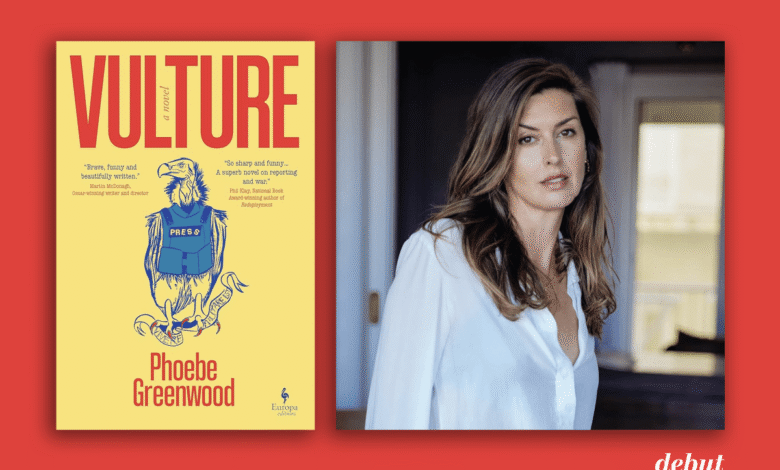Vulture author Phoebe Greenwood believe the birthplace of stories are The Greek Myths – debutiful

Phoebe Greenwood is a London-based journalist who was a freelance correspondent in Jerusalem covering the Middle East for the Guardian, Daily Telegraph, and Sunday Times between 2010 and 2013. From 2013 to 2021, she was an editor and correspondent at the Guardian specialising in foreign affairs.
Her debut novel, Vulture, is a war satire akin to Catch-22, where an ambitious young journalist is sent to Gaza to cover the war. Throughout it, her writing bites at how tragedy feeds the Western media machine.
We asked Greenwood to answer our recurring My Reading Life Q&A so readers could get to know the books that influenced her life and inspired her debut book.
What were the first books you were obsessed with as a child?
I come from a family of readers and writers — enthusiasts and professionals — so books have been a big part of my world, routine and interior life since I can remember. The first books I really remember reading to myself were the Enid Blyton Magic Faraway Tree books. I loved those stories, I wanted to live in them, despite Fanny always having to make all the sandwiches. Different worlds spinning about at the top of a huge tree functioning as an apartment block? Amazing. I was deep into fairy tales too, particularly stories about witches (I spent many long afternoons sat on a broom lodged between the branches of a tree willing it to take off). Baba Yaga felt like an ally. I was given an ornate copy of Grimms’ Fairytales when I was about seven and it remained one of my most treasured possessions.
What books helped you through puberty?
I did not enjoy school and was constantly being advised by my mother to ‘just go and eat your lunch in the library.’ So, I read a lot. The obsession I developed for witches as a young girl has never really abated but as a teenager, I sought out stories of transformation and magic. I guess I was just a huge fan of feminist writers of magical realism, in particular Jeanette Winterson and Angela Carter (The Passion & Wise Children in particular but any would do). Oddly, I was also a mad fan of Thomas Hardy, in particular Tess of the D’Urbivilles. A virginal woman sacrificed to nature and the lusts of dark men: very unfeminist but the perfect level of drama for an adolescent girl I suppose.
What book do you think all teenagers should be assigned in school?
The Greek Myths, Robert Graves. The birthplace of all stories, really, and great entry-level psychology. The tales of Oedipus and Elektra could help out most kids.
If you were to teach a class on Damn Good Writing, what books would make the syllabus? I studied English Literature at University College London, which I believe to be the greatest English literature degree in all the world. I’m stealing the structure of their course here because I believe it to be perfect: it educated us in the story of story telling. A great part of understanding damn good writing is understanding where it came from, what it draws on and how it adds to it. So we would have to start with the Bible because it informs so much of what follows in the Western cannon, we’ll understand metaphor with William, character with Thackeray, narration with Wolf, dialogue with Wodehouse, perfect prose and anti-heroes with Nabokov, and end with Denis Johnson who I discovered late and am currently obsessed with and believe to be a (the?) modern master, as accessible as he is esoteric and transcendent.
● The Old Testament
● Beowulf, Seamus Heaney translation
● Sonnets, William Shakespeare
● Vanity Fair, William Makepeace Thackeray
● Mrs Dalloway, Virginia Woolf
● Right Ho Jeeves, PG Wodehouse
● Lolita, Vladimir Nabokov
● Jesus’ Son, Denis Johnson
What books helped guide you while writing your book?
I wrote Vulture with a stack of books about me that functioned as totems. I dipped into them regularly and whenever I found myself stuck, not because I thought I was writing anything similar, but because I needed to be reminded what great writing looks like. What’s odd is that while I’ve been wildly flattered to see the book being compared to Catch-22, Scoop and The Quiet American in reviews, I hadn’t read one of them. My Vulture totems were:
● The Master and Margarita, Mikael Bulgakov
● Vile Bodies, Evelyn Waugh
● The Heart is a Lonely Hunter, Carson McCullers
● Pastoralia, George Saunders
● The plays of Martin McDonagh
● Sisters Brothers, Patrick deWitt
What books are on your nightstand now?
The Largesse of the Sea Maiden, Denis Johnson
Bad Behaviour, Mary Gaitskill
(Dying to read London Falling, Patrick Radden Keefe)

